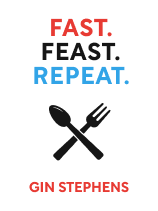

This article is an excerpt from the Shortform book guide to "Fast. Feast. Repeat." by Gin Stephens. Shortform has the world's best summaries and analyses of books you should be reading.
Like this article? Sign up for a free trial here .
Have you tried dieting for weight loss but found that the excess weight always comes back? Are there weight loss methods that work long-term?
Dieting for weight loss rarely works in the long term. When the diet is over, many people find that the weight comes back. Some people even pack on more excess weight than they had before the diet. If this sounds like you, it’s time to leave a dieter’s mindset and instead adopt an intermittent fasting (IF) mindset.
Here’s how to lose weight with intermittent fasting.
Overcome Dieting Confusion
In his book Fast. Feast. Repeat., Stephens explains that decades of contradictory advice about how and what to eat has created immense confusion, a tangle that she calls “diet brain”: When you no longer have any clue how to eat “properly.”
| “Nutritionism” and Diet Confusion In In Defense of Food, Michael Pollan argues that when Americans began looking to medical experts to guide how we eat, we lost touch with tradition that once guided us to eat well. Pollan explains that the doctrine of “nutritionism,” or looking for the magic nutrient-based solution to health problems, produced conflicting views about what is healthy. This is because such research focuses on nutrients rather than the whole-food contexts in which they exist. Because studies have concluded that certain nutrients are problematic instead of certain foods, we’ve had trends such as the low-fat era, the anti-cholesterol era, the anti-carb era, and so on—and oddities like low-fat ice cream. Pollan stresses that so long as we remain confused about diets and nutrition, we’ll struggle to reclaim our health and to change our lifestyles for the better. To change this, his rule of thumb is to eat real, mostly plant-based food in moderation and to listen to your body to know when you’re full. |
Recent research suggests that there’s no such thing as a universally optimal diet. Instead, different individuals seem to respond differently to the same foods. This is called “bio-individuality.” For instance, you might do well with whole wheat bread while a friend doesn’t.
Stephens explains that this gives us good reason to stop thinking about dieting as a moral issue. As she explains, dieting causes you to think in terms of “good” or “bad” behavior, and we’ve learned to punish ourselves for being “weak,” if we fail at dieting. But since there’s no universally perfect diet, there’s nothing to fail at. You’re simply learning how your body works, and you can stop worrying about whether you’re “falling off” the diet.
(Shortform note: The idea of bio-individuality originates from the Institute of Integrative Nutrition, a for-profit organization that teaches a course in “Health Coaching” and advocates for bio-individuality. In the update we’ve linked, the IIN explains that the National Institutes of Health (NIH) has begun to study the value of precise, individualized health plans—lending credibility to the concept. They also note that the studies used to produce the standard blanket diet recommendations—such as the food pyramid—used only 3% of participants from African or Hispanic ancestry.)
Learn to Eat Intuitively
Since there’s no perfect diet, Stephens says we can stop worrying about the conflicting diet advice. Instead, learn to intuitively regulate your eating by getting back in touch with your body’s natural appetite signals.
Ghrelin signals when we’re hungry, and leptin signals when we’re satisfied. As infants, we can easily sense these signals and know when we’re hungry or full. But we lose touch with them as we age, making it easy to overeat and gain weight. According to Stephens, intermittent fasting helps you tune back into your appetite signals. When you’ve tuned back in, you can use those natural signals to eat what feels best to you and to “stop when satisfied.”
(Shortform note: The notion of “intuitive eating” originates from a 1982 book called Diets Don’t Work by Bob Schwartz. He advocated, simply, to eat only when you’re hungry, to eat slowly, and to stop eating when you’re full. The idea was popularized in 1995 in Intuitive Eating by Evelyn Trible and Elyse Resch, who detailed how to overcome the “dieter’s dilemma”—the conflicting desires to be thin and to binge on treats—by rejecting the “diet mentality.” Given the similarity of these terms to Stephens’s (“diet brain”), it’s likely she lifted her ideas from this earlier work.)
When tuning back in, it takes time for your appetite signals to reset. To help get you there, Stephens offers the following tactics:
- Tactic #1: Eat less than you normally would—You can do this by remembering “hara hachi bu,” an Okinawan practice that means “eat until 80% full.”
- Tactic #2: Be mindful of your experience—If you notice a “sigh” of contentment, that’s one signal to stop eating. If you notice that the food has lost its initial deliciousness, that’s another signal.
(Shortform note: In Intuitive Eating, Tribole and Resch argue that one key to healing your relationship with food is to focus on the process. In this view, weight loss isn’t the goal so much as a side-effect of your commitment to eating well. As you learn to listen to your body and eat when you’re truly hungry—and to eat what your body truly wants and needs—you’ll naturally trend toward a healthy weight for your body.)

———End of Preview———
Like what you just read? Read the rest of the world's best book summary and analysis of Gin Stephens's "Fast. Feast. Repeat." at Shortform .
Here's what you'll find in our full Fast. Feast. Repeat. summary :
- How intermittent fasting can help you lose weight, feel better, fight disease, and live longer
- An explanation of the cutting-edge science that supports fasting
- How to follow a four-week quickstart program to adapt to this new lifestyle






